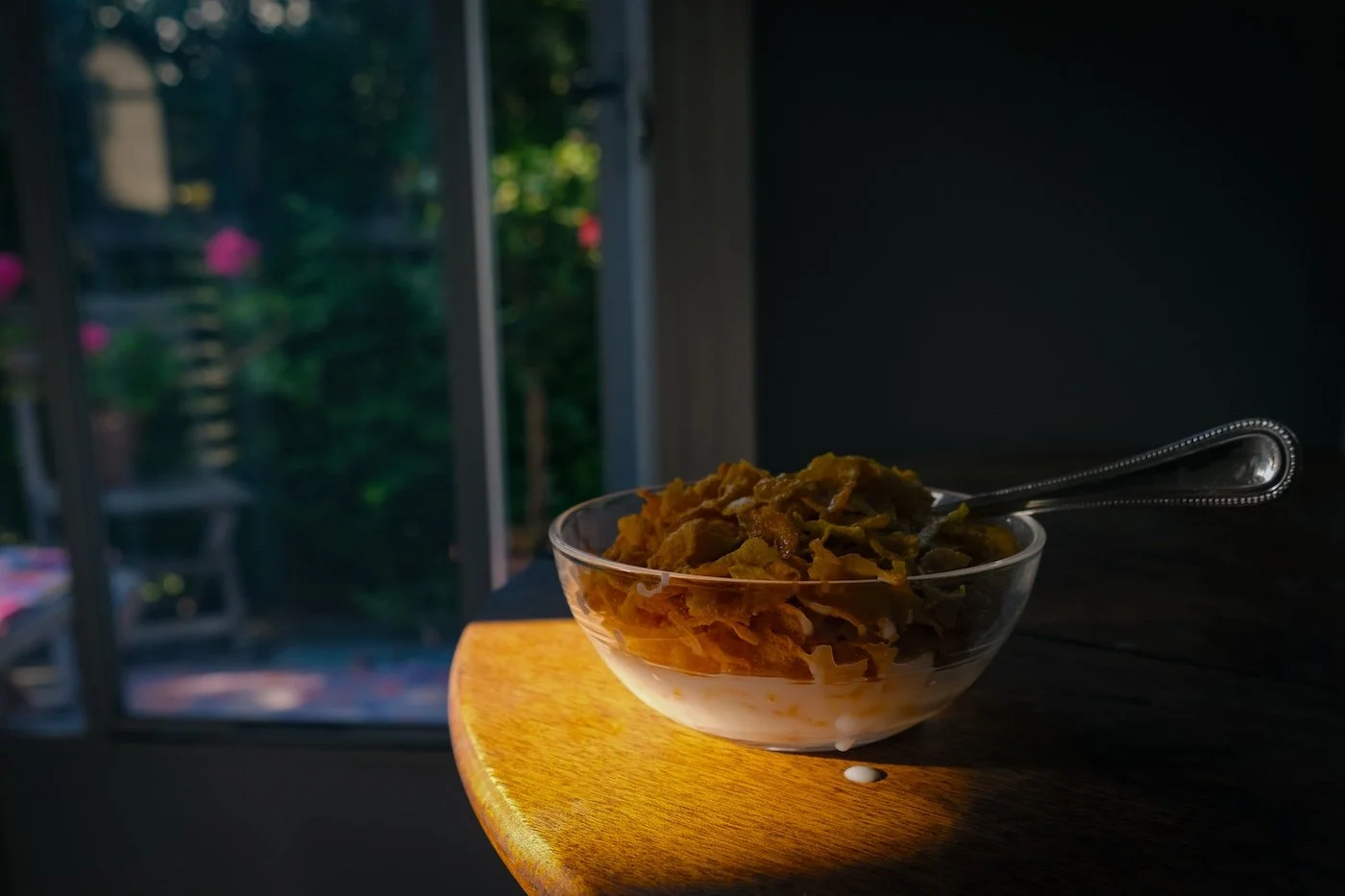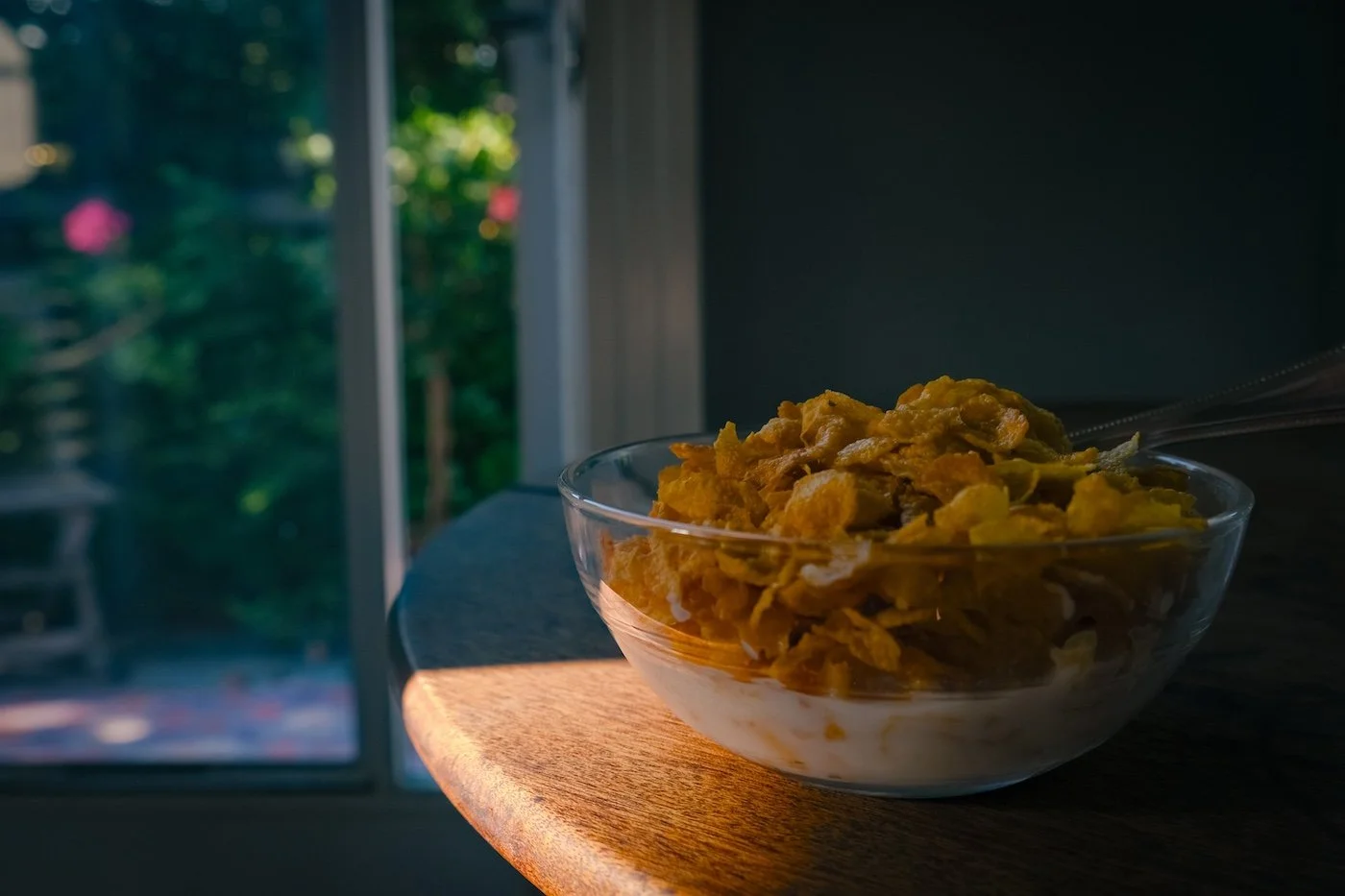Blessings and Praise and What Do You Want From Life?
It’s the time of year, maybe, when I remember my friend Michael McCarthy. I have some cornflakes in his honour. I read my favourite poem by him. I think of all the lives he touched, and how he touched mine, and continues to. He wrote about our meeting in his book Like a Tree Cut Back. You know, I never remember the time of year when people leave us, but then again, I must because I just looked it up and it was July 10, 2018. I’ve shared his poem before but here it is again:
Blessing
I bless you in the name of the morning
the first thing of it, whispering
through the folds of my ear-imprinted pillow.
In the name of the mirror, toothbrush
and the slow shower that clarifies
vowels and consonants of my waking.
I bless you in the name of the breakfast
the wake up of it, orange juice and
Quaker Oats, sometimes Cornflakes
milk, white and breathless
becoming supple flesh of sally-rod
bone of unbreakable dolomite.
I bless you in the name of toast, buttered
spread flat, not to mention marmalade
its orange ribs rolled into this glass jar.
And in the name of an egg, boiled
in a white fountain-head of bubbles
the shell cracked open, and salted.
I bless you in the name of the chair, upright
my feet soft-shod on the floor-shine.
In the name of Gerry, who lives downstairs
and makes no more noise than a mouse
and in the name of the mouse
for whose absence I am grateful.
I bless you in the name of the marigold sun
remembering me to the meadows, where cows
who neither know nor number, graze
in a mist that is minding its own business
as it rises over the river
disappearing until nightfall.
I bless you in the name of the air
rising over my childhood
when I stood to my waist in the water
splashed in a sacrament of swimming.
Where I ran round the field with my sister
in her summer of first communion.
I bless you in the name of that summer
for girls who came down from the city
and our games played in white clover.
Once and for all and over and over
for moments of eternity
here and now, and forever. Amen.
I’m sure I’ve told the story from my pov often here or there. I was working at The Book Company in Southgate Mall. The year was 1995. And the poetry section was all mine — I’d somehow got permission to order whatever I wanted and it had to be the biggest poetry section any mall had ever seen. Here is Michael’s description in his book: “On my second day in Edmonton, I visited a bookshop in the local mall. A young, tall woman approached me and asked if she could help. I said I was fine, just browsing. She replied: “In the poetry section.” I asked if she was a poet and she answered, “Sort of.” I explained how I happened to be in Edmonton. I was hoping to meet the author of the book I was browsing. She told me if I went to a certain cafe that Friday evening I would meet most of the people who were part of the poetry scene in the city.” The book he wrote in his year in Edmonton would go on to win the Patrick Kavanagh Award. We would correspond for years and see each other a couple of times, as he did a few others also from Edmonton.
He was a catholic priest, but we interacted as poets, poet to poet, soul to soul. Well, he was a true soul, true blessing. I think of him often.
When I read his poem I also think of John O’Donohue who I’ve written about here. His book of blessings is so useful. From that earlier post:
"Who has the power to bless?" asks O'Donohue, and answers:
“This question is not be be answered simply by the description of one's institutional status or membership. But perhaps there are deeper questions hidden here. What do you bless with? Or where do you bless from? When you bless another, you first gather yourself; you reach below your surface mind and personality, down to the deeper source within you - namely, the soul. Blessing is from soul to soul. And the key to who you are is your soul.”
The short answer to who can bless is: anyone, everyone. O'Donohue also says, "Wherever one person takes another into the care of their heart, they have the power to bless. There are things we never do, simply because it never occurs to us that we can do them. To bless someone is to offer a beautiful gift."
Michael always said I was an angel but I always knew it was he who was.
Also, I should say here that I’m of no religion which made no difference to Michael.
Well, let’s move from blessings to praise. In a book of conversations the marvellous poet Li Young-Lee says this:
“Praise. Praise is the state of excess, ecstasy. We counted up all the deaths; we counted up all the dying; we counted up all the terrible things in life, and guess what? There’s still Van Gogh painting sunflowers, there’s still morning glories. There’s an excess in the universe, a much-ness, a too-much-ness.”
There is a brimming over.
On Poets.org there is a wonderful history of the praise poem, which begins,
“Praise poetry was popular in medieval literature and during the Renaissance, when it often expressed worship of or admiration for heroes, kings, or deities. Praise poetry has also long been one of the most widely used poetic forms in parts of Africa and continues to be a familiar literary form in various African cultures.”
It’s a bit heartbreaking to read this poem by Elizabeth Alexander written for the Obama inauguration at this point, but it’s an excellent public praise poem.
There are over 1300 praise poems currently listed on the Poetry Foundation. (Or at least keyworded praise). You might begin with Joy Harjo’s “Praise the Rain” or Susan Nguyen’s “Ode to Hunger.”
A blessing can be a powerful thing to write, to give, and the same goes for a praise poem. It clarifies what is important.
I recently shared a Raymond Carver poem on my instagram.
LATE FRAGMENT
by Raymond Carver
And did you get what
you wanted from this life, even so?
I did.
And what did you want?
To call myself beloved, to feel myself
beloved on this earth.
I’ve been lately thinking again (praise to my recurring thought patterns and to circling back over and over to a simple question) about how powerful it is to ask someone what they want. (Queue the Spice Girls here). In the Carver, written at the end of his life, the poem begins with the question someone asks him, and his answer, “I did.” And what did he want? Well, if that doesn’t crack open your heart.
I’ve been thinking about the question “What do you want” in conjunction with Marcus Aurelius’s lines about how we have it within our power every moment to be reverently content. And when I boil it down, when I really think about how my daily life happens to be, then mainly, I can say every day: I am reverently content. I can die tomorrow knowing that I’ve written most of the books I want to write. I’ve taken some beautiful photographs. Most importantly, my daughter is beautiful and my husband is beautiful and they are both making beautiful things. I get to help people at the library many times a week. Nothing is perfect, nothing is ever not precarious. And I want more. More. More tries at all of the above. And still I can be reverently content. I can call myself beloved.
My latest song obsession is Lifening from Snow Patrol.
“This is all I ever wanted from life, this is all I ever wanted from life
This is all I ever wanted from life
Words of reassurance but only if they're true
Just some simple kindness, no vengeance from the gods”
The line, “To share what I've been given” resonates for me.
Last week I had a number of folks write and thank me again for my NY day post of 25 Words. So I thought I’d remind you of the link again, in case you’d like to take a look again at the half way point of this year.
Last thought:






